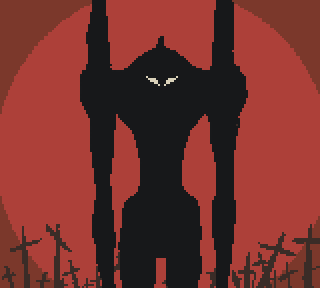
Series Thoughts: Evangelion
Last weekend I found myself with nothing pressing to do. No chores, no responsibilities -- just 2 full days of free time to engage in side projects, hobbies, and hang out with some old friends.
Instead, I ended up binge-watching Evangelion and most of the related films.
-I remember having watched at least some of the original series in the past, and in my head it was "That robot anime with depressed teenagers and religion"; however revisiting it I think it's more accurate to call it "an anime about mental illness (with robots and religion)".
The original series, while brooding and depressing, is excellent. It's a story about loneliness in many forms, how humans cope with it, and famously puts forth that nobody can every truly understand another person, and thus we are all, at the end of the day, alone in a way that can never be overcome.
It's been a bit since I watched classic a 90's anime, and it was honestly refreshing. Yes, it was sexual and hyper-violent, but both of these things felt in-context and well-used. The sexuality on display in the original show never felt like fan-service and was usually through the lens of another character or was used to demonstrate vulnerability. The the violence present was also used effectively, as the unexpectedly gory battles managed to elicit dread, panic, and fear.
The original series is all about eliciting strong emotions, and does so both through its soul-crushing character development, as well as its cluster-fuck narrative about the Evangelion units, the end of the world, and many other very poorly thought out and explained developments. Remember, though, we're not here to understand, we're here to feel.
By the end of the original series, you end up feeling very confused, as the story nosedives at the end, wrapping up rapidly with two minimum-budget slideshow-style episodes taking place inside Shinji's head. Completely incoherent, honestly.
The ending was re-explored and expanded upon in The End of Evangelion, which gives the series a more concrete (if not more coherent) ending. It opens with the protagonist masturbating over one of the other characters who's comatose in the hospital, and it just gets crazier from there. It isn't a happy movie with a happy ending; nobody gets better or wins by the end.
While the film strove to explain things better and give the series some closure, it honestly failed to do either. Things just went crazy and ended on a terrible note intended to be the period on a very incoherent run-on sentence.
Later on, the Evangelion Rebuild tetralogy came out, consisting of 1.0 You Are (Not) Alone, 2.0 You Can (Not) Advance, 3.0 You Can (Not) Redo, and finally 3.0+1.0 Thrice Upon a Time (because fuck consistency, right?)
These movies are entirely new animation and tell a new story with the familiar characters. The first 2 films retell the original story, 1.0 being almost beat-for-beat with the series' first 6 episodes, and 2.0 deviating significantly from there to tell a new story with the same characters.
The different ending in 2.0 leads to 3.0 and 3.0+1.0 several years in the future and ultimately a final, much less metaphysical (a little, still) ending to the series as a whole.
I found the movies to be interesting. They offered a different take on not only the stories, but the characters. Each of the characters is more open to growth than their original versions, which I think was necessary to give them space to progress in the films. At the same time, without the context of the depth of the despair these characters faced in the original series, they may have felt much less rounded out. I felt that a big part of the joy that came from the new films was watching the characters be better to each other this time around. Not all of them are better to each other, mind, but there's a lot of tension and relief at play here which is only possible with the context of the original series.
As a side note, I didn't appreciate the much more blatant fan-service in the films. Instead of vulnerable or character-driven moments of sexuality, we get "here's the butt of a sleeping girl" or "let's put this girl in a super revealing outfit while nobody else is there to see". The violence in the movies was also much more geared towards "action" instead of pushing for eliciting other emotions, and while there many epic battles in the films (especially the later ones), the CGI used for battle scenes made many of them feel somewhat cheap.
Story-wise the film is much easier to follow with slightly better explanations, but it still falls to psuedo-religious buzz-words and complete narrative chaos by the end. While we lose the original thesis about loneliness, the character development is much better handled this time 'round. The characters feel not only that they grow in the films, but that they've grown since their inception in the original series, even if they're not directly connected. It feels good to have the characters get a redo and a different ending, and even after sitting through 6+ hours of complete nonsense I teared up by the end.
All in all it's a very interesting series, and you really need to experience both the original series and the rebuild films to get the whole picture. Taking only the original series (+ End of Eva.), you're left without closure. Taking only the rebuild movies, you're left without context that allows the film to have any impact at all. Together, however, you have a fascinating and unique work that captivated audiences for over 25 years, and for good reason -- it makes you feel stuff. Mostly confusion about what the hell the going on, but there's a lot of empathy, frustration, dread, relief, and joy to be found here for those who take the time to watch.
It should be noted that in my watching of this whole collection I didn't do a particularly deep dive into the Director's backstory and history, but I understand that there's a whole other level to this story and the themes within -- but I like to enjoy and consider works on their own before bringing in the creator's voice.
I also want to note that I'm still very confused about the character Mari, who was introduced as a new Eva pilot in the Rebuild films. She really feels out of place in the story, has zero backstory, and then ends up being super important and it totally felt like cheating on the part of the series to have her get to show up and be perfectly well adjusted.
Anyways, if you haven't seen the full collection yet and ever end up with a full weekend of no responsibilities... consider blowing it on a fucked up pseudo-religious nonsense anime series that will make you feel lots of stuff. It's got giant robots.
